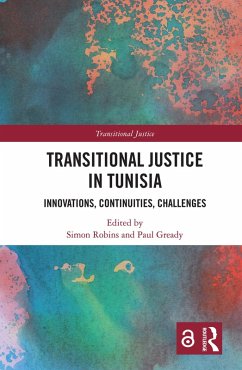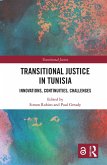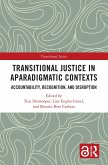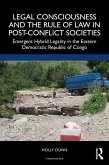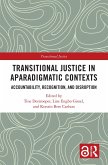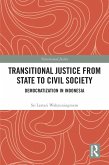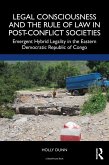Grounded in new empirical material as well as a broader awareness of transitional justice, this book provides a thorough assessment of transitional justice in Tunisia. Beyond an overview of the process, it critically engages with key questions such as the extent to which the process articulated global contemporary practice, such as liberal state-building and narrow conceptions of justice as civil-political rights, and to which it generated novel approaches at odds with the mainstream that can inform global practice. The book examines how the transitional justice process in Tunisia has been contextualised and made relevant to the nation's circumstances and needs. It looks at innovation at the level of formal mechanisms and at the dynamics of mobilisation and contestation surrounding transitional justice both from civil society organisations and victims' groups. Bringing together analysis from legal scholars, social scientists as well as activists and practitioners, the book challenges the legalism of transitional justice discourse globally, engendering a dialogue between these legal and judicial approaches on the one hand and alternative, more diverse and radical approaches to justice on the other, in order to both deal with the past and to address ongoing injustice.
This first book in English to address the dynamics and mechanisms of the transitional justice process in Tunisia will appeal to students and scholars of transitional justice, human rights, peacebuilding, conflict and peace studies, development, and security studies, as well as policymakers and practitioners in these fields, and others with interests in Middle Eastern studies.
Dieser Download kann aus rechtlichen Gründen nur mit Rechnungsadresse in A, B, BG, CY, CZ, D, DK, EW, E, FIN, F, GR, HR, H, IRL, I, LT, L, LR, M, NL, PL, P, R, S, SLO, SK ausgeliefert werden.
"This is an excellent and critical addition to the literature on transitional justice. Using Tunisia as a case study, a mix of academic and practitioner authors are able to evaluate the successes and failures of transitional justice after a major political transition. The ethical and practical difficulties faced by institutions and citizens in Tunisia offer lessons to other contexts undergoing or contemplating change. What becomes clear in this volume is that transitional justice experiences are dynamic, have winners and losers, and have unanticipated outcomes. This work is highly recommended. Robins and Gready have been at the forefront of our understanding of the opportunities and limits of transitional justice, and this book pushes debates forward." Roger Mac Ginty, Professor in Defence, Development and Diplomacy in the School of Government and International Affairs, University of Durham, UK
"Tunisia's process to deal with its past has been as turbulent as the country's transition. This volume brings together academics and practitioners who extensively highlight the intricacies of this process and thoroughly analyse them. It is essential and timely reading for anyone studying Tunisia's contemporary history or seeking to draw lessons from its transitional justice efforts." Habib Nassar, Director of Policy and Research, Impunity Watch

